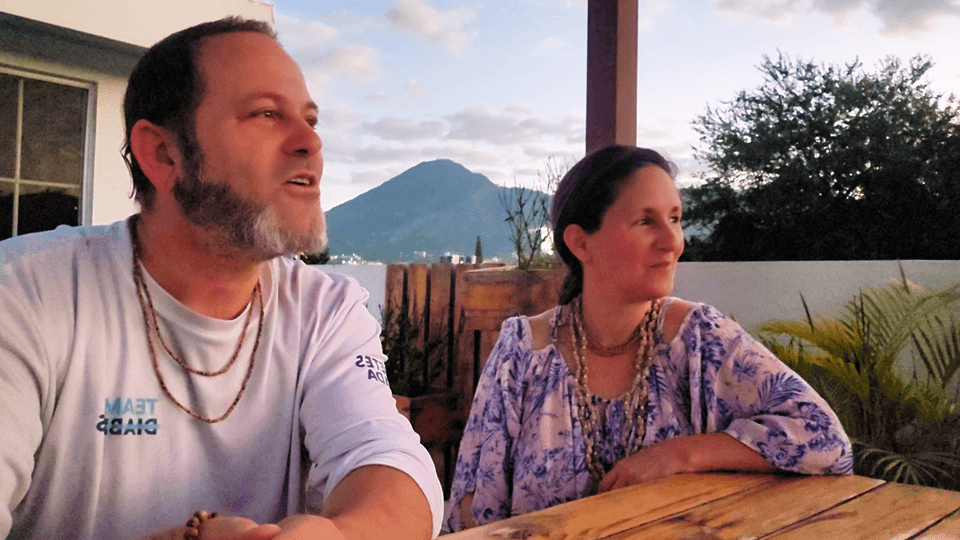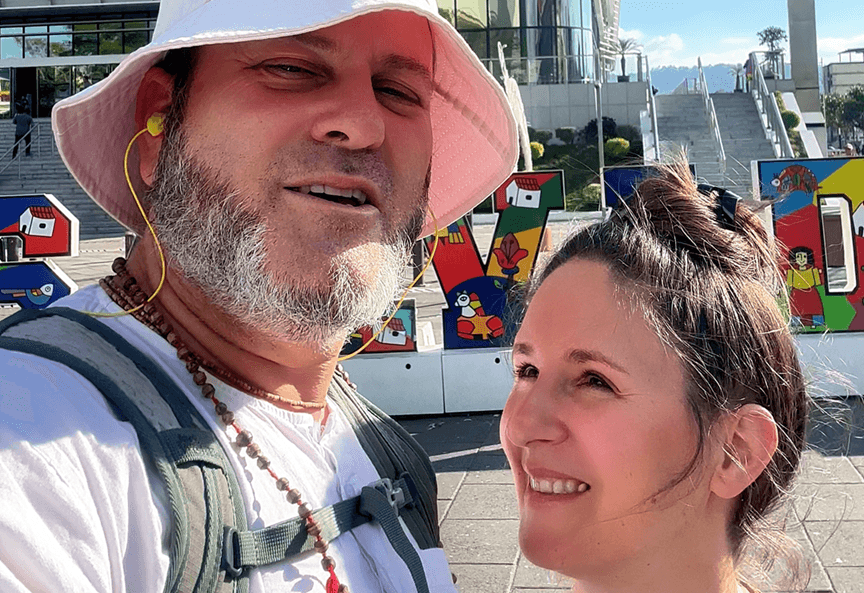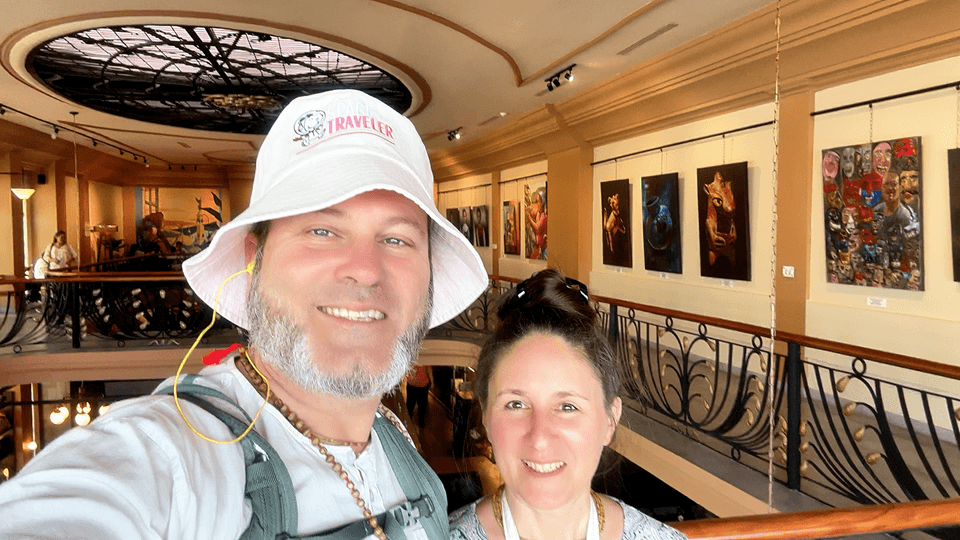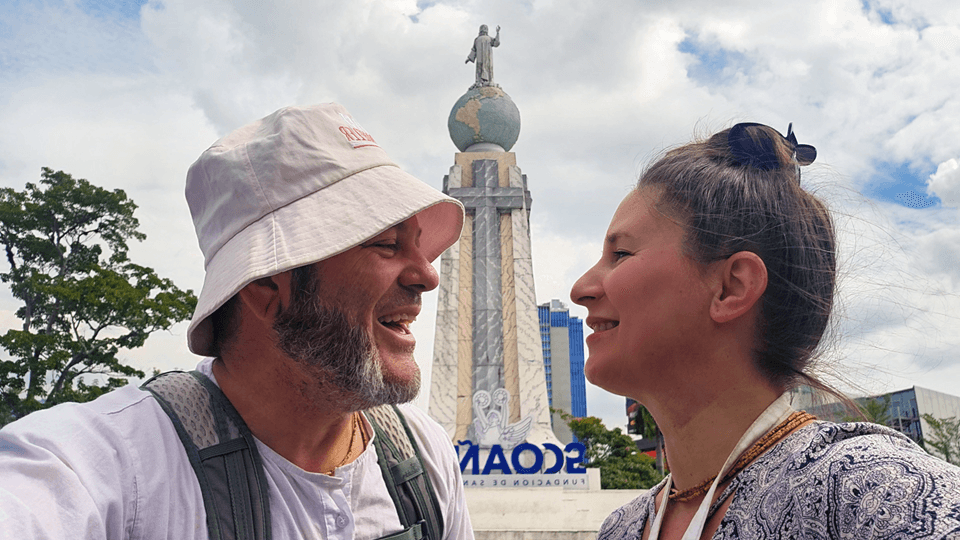Simultaneously One and Distinct: Living, Loving, and Chanting in the Spirit of Lord Chaitanya
Welcome, friend. However you found your way here, pull up a chair and take it easy—this space is for hearts with questions, not for people on some spiritual assembly line or ambition-driven hustle. We’re not selling enlightenment, we’re not out to monetize seekers, and we’re certainly not shooting for guru status. Think of this as a living room for souls who want to share stories, questions, and the simple joy that comes from being together in honest conversation.
If some of these words sound a little new or mysterious, that’s alright. Breathe, smile, stay curious. We don’t fully understand everything, either, and that’s what makes the journey interesting. We’re all just living entities trying to hold on for the ride—welcome to our little window into the experience.
Mark, Maria, and the Everyday Magic
We’re Mark and Maria (aka Juicy MagiK). It might not come through in a transcript, but we don’t do stiff formality or distant, ‘expert’ posturing. Some days our videos start by accident or with a random greeting. Sometimes we even get playful with languages—“Jambo!” or “Namaste” spills out. Each try is a new beginning.
What matters is building real connection, a sense that no matter who you are or how you arrived here, you’re welcome. We laugh, we stumble on our words, we say hello a dozen different ways, and we keep things real. Why pretend to be serious saints when life just keeps turning up delight (and heartbreak) at every corner?
Where Oneness Meets Distinction: Achintya Bheda Abheda Tattva
Now, let’s get into the heart of our talks. It’s a mouthful, but stick with us—Achintya Bheda Abheda Tattva. Try saying it five times fast! What sounds complicated is really simple, and kind of beautiful: it’s the principle of being one with God and still being ourselves.
This teaching comes from Lord Chaitanya, the joyous mystic and teacher, who walked Bengal (and the wider land of Bharata) just a handful of centuries ago. That’s practically yesterday compared to most major prophets. What drew us so much to Lord Chaitanya wasn’t just his poetry, miracles, or the sweetness of his name, but that his message is direct, recent, and connected to living, breathing teachers today.
Like the idea? Learn more about Achintya-bhedabheda-tattva for a deeper explanation of how this philosophy shapes the balance of unity and difference.
What Does “Simultaneously One and Distinct” Mean?
Imagine a drop of salty ocean water. If you taste just that little drop, it’s pure ocean—salty, fresh, alive. The drop and the ocean share all the same qualities, but nobody would say the drop is the whole ocean. It’s just a tiny little bit—unique and individual, not lost, not dissolved into some isolation or nothingness.
Or think about sparks from a fire. Each spark glows, but it’s not the whole blaze. It carries the nature of the fire, but still, the fire is much greater. That’s how Lord Chaitanya described our relationship with the Divine. We’re made of divine stuff, we’re precious and eternal, and still, we’re not the same as the source.
Sometimes the philosophical world splits into two camps—those who say everything is One, and those who insist everything is separate. But if we just look at life, at marriage, at friendship, we see there’s both. Mark’s wallet is his, Maria’s is hers. There’s real togetherness, but also real boundaries. If everything was just one big collective blob, there’d be no need for kindness, no place for forgiveness or love.
The idea is found at the heart of Lord Chaitanya’s teaching—there is inconceivable oneness, and inconceivable difference, all at once. This simultaneous oneness and difference is not meant to be solved like a math problem, but to be lived and experienced.
The Matter of Karma and Identity
One question pops up: If we’re all one, why do we each deal with different karma? Why does one person experience joy while another faces struggle? This isn’t abstract philosophy—it comes home when you think about families, communities, or nations. There’s a desire for fairness, but not sameness. That’s the rub.
In practical spiritual terms, you don’t inherit someone else’s karma. Each soul has its own journey, its own ripening, its own field to plant and harvest. In the old stories and scriptures, it’s said that you don’t inherit your father’s sins just because you share his blood. Everyone stands in their own light, or their own shadow. At the same time, we’re all held together by something deeper.
If you want to grasp the philosophical side, often called Gaudiya Vedanta, you’ll find some excellent overviews and quotes in the Acintya bhedabheda tattva philosophy.
Spiritual Lineage: Staying Rooted, Staying Real
So we talk a lot about teachers and lineages. In our view, if you’re going to teach, you should have a teacher, and that teacher should have a teacher, going all the way back in time. That’s called disciplic succession, or in Sanskrit, sampradaya.
This isn’t about making a holy club or putting yourself above others, but about honesty. It’s easy to read books, pick up ideas here and there, but when you’re plugged into a living tradition, there’s accountability, humility, recognition that you’re carrying forward something much bigger than yourself. Lord Chaitanya is still represented by people alive today. The chain is unbroken.
The World: Suffering, Laughter, and Little Joys
Life, no matter how spiritual, still comes wrapped in trouble. We all have to face birth, old age, sickness, and death (and don’t forget taxes). Even when you’re on a spiritual journey, it’s easy to get tossed by natural disasters, by the shake and rumble of things outside your control. Suffering, says the old wisdom, hits everyone through the body, mind, other people, and the whims of nature.
But the magic is in how you live through it. Humor breaks through. If you can joke about Maria losing her wallet (again) or compare the whole question of oneness to splitting dessert, you find there’s still music behind the practical knocks and headaches.
Practices Anchored in the Everyday
The foundation of our practice is simple. We hear and repeat the names of God, sing together, and try to shape our lives around the basics—no drama, just daily steps. In classic yoga, they call this “yamas and niyamas”—dos and don’ts. In other words, small, practical choices.
Our tradition asks us to follow a handful of rules—not to kill joy, but to anchor ourselves. Think “kosher/halal” or “vegetarian/vegan.” These aren’t about being “holier than thou.” They’re about clearing space so we can focus on what matters and let each other be free. There’s freedom from (all the noise, all the push-pull of nonsense) and freedom to (live in a way that makes space for joy).
If you get curious about joining a supportive community or have questions, Juicy MagiK has an Agora portal for sharing and learning together. The door’s open, always.
The Gift of a Simple Prayer
Lord Chaitanya left just eight core prayers. That’s not a lot, considering all he taught and all the mystical flashes that followed him. Out of those, his third prayer is our daily bread. We carry it in our hearts as a kind of reminder before practice—like tuning a guitar before you play.
It goes (and you can sing it, too, if it feels right):
“One should chant the holy names of the Lord in a humble state of mind,
feeling oneself to be lower than the straw in the street,
more tolerant than the tree,
devoid of all sense of false prestige,
and ready to offer all respects to others.
In such a state of mind one can chant the holy names of the Lord constantly.”
Why do we love this so much? Because it’s not about being a spiritual superstar. It’s about bowing to life, to one another, to the Divine hiding in every leaf and every glance.
Everyday Mysticism: Small Steps, Lasting Peace
All this talk of metaphysics is nice, but we keep coming back to what feels real: peace, freedom, and the gentle joy of letting others be. As Bob Dylan crooned, “You gotta serve somebody.” Better, we figure, to serve the Highest. Gather as much real information as you can, slow down, leave some space for others, and show up again tomorrow. That’s sadhana bhakti: the simple, repeated steps that turn life into a daily adventure.
Lord Chaitanya’s teachings, and the spirit with which we try to share them, let us find home—not in a place, but in practice and presence. There’s mystery, magic, and a lot of freedom right here in the muddle of it all.
If you feel a tug on your heart, or want to know more about how unity and difference shape the journey, you might enjoy reading this introduction to Achintya-Bheda-Abheda Tattva.
Signing Off (For Now)
That’s day two from us—Mark and Maria, your friendly neighborhood spirituality fans. Thank you for being with us, for your patience, your laughter, your curiosity. We hope to meet you again tomorrow, or whenever you need a friend on the path.
May you chant with humility, love with freedom, and know that you’re both a spark and a drop, forever radiant and never alone.
Namaste, haribol, and peace be with you.
If you want to join discussions, share your questions, or just send a wave, wander over to the Juicy MagiK Agora community portal.
Want to support or learn about Juicy MagiK’s projects in the world? Feel free to browse our current projects.
TLTRExcerpt
Recent Posts

Last Night in San Salvador: Christmas Blessings, Winter Solstice & Chanting With a Sweeter Mood

We found El Salvador’s National Library, Then The Cathedral Pulled Us In

Our Tiny San Salvador Video Turned Into a Whole Blessing (Starbucks Changas and All)

We Saw Christ With His Arms Wide Open, So We Talked About Love (No Labels)
